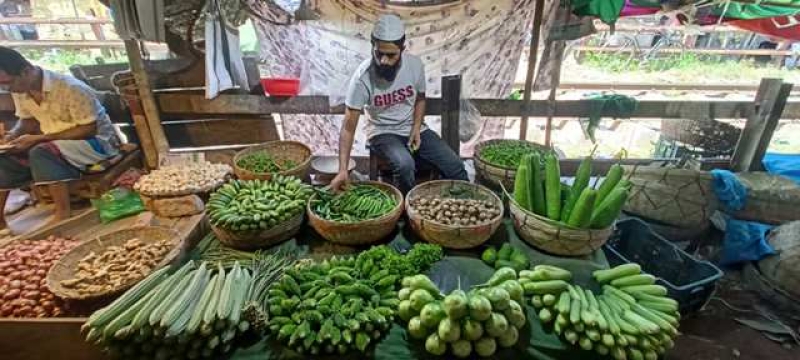- Nation Votes Tomorrow in 13th Poll, Referendum |
- Key in your hands, use it wisely: Prof Yunus tells voters |
- Yunus Urges Voters to Shape a ‘New Bangladesh’ |
- Bangladesh Polls: Campaign Ends as Voters Weigh Pledges |
- Bangladesh Heads to First Gen Z-Driven Competitive Poll |
Prices of winter vegetables drop in Khulna
Essentials continue to rise

Khulna vegetable market
Khulna, Dec 30 - While the prices of winter vegetables have decreased in Khulna, that of essential items such as rice, lentils, edible oil, chicken, and beef have surged, creating challenges for low- and middle-income consumers.
Prices of all varieties of winter vegetables have dropped by Tk 8-10 per kilogram. However, despite regular monitoring and raids by the Directorate of Consumer Rights Protection, edible oil, chicken, beef, rice, and eggs remain expensive due to price manipulation by unscrupulous traders.
Rice prices have seen a sharp increase. As of Friday, coarse rice (Swarna) was selling at Tk 54 per kilogram, Atash Balam at Tk 65, fine Miniket at Tk 75, lower-quality Miniket at Tk 65, Basmati at Tk 75-76, and Kalijira at Tk 120. In contrast, one and a half months ago, coarse rice was Tk 45-46, Miniket was Tk 70, and Kalijira ranged from Tk 110-115, reflecting an increase of Tk 5-6 per kilogram.
Chicken prices have also soared. Broiler chicken was selling at Tk 200 per kilogram, layer chicken at Tk 340, cock chicken at Tk 320, Sonali chicken at Tk 320, and local chicken at Tk 470. Within two weeks, these prices have climbed beyond the purchasing power of many consumers, particularly those with limited incomes.
Beef prices remain steep, selling at Tk 700-750 per kilogram in both urban and rural markets. Despite fines imposed during raids by mobile courts, beef prices have not decreased, drawing criticism from consumers.
The price of edible oil has surged again. Five-liter bottles of soybean oil were sold at Tk 875, or Tk 175 per liter. Loose soybean oil was priced at Tk 195 per liter, while super oil ranged from Tk 178-179 per liter. A week ago, five-liter bottles of soybean oil were sold at Tk 860, loose soybean oil at Tk 190, and super oil at Tk 180 per liter.
Lentil prices, however, have remained stable. Fine lentils were priced at Tk 140 per kilogram, while coarse lentils sold for Tk 110.
Sugar prices have slightly dropped. White sugar was selling at Tk 125 per kilogram, and packaged brown sugar at Tk 140. Previously, they were priced at Tk 140 and Tk 150, respectively.
Egg prices remain high. Broiler eggs were priced at Tk 46 per dozen for red eggs and Tk 44-48 for white eggs in urban and rural areas.
In contrast, vegetable prices have dropped significantly. New potatoes were priced at Tk 60 per kilogram, old potatoes at Tk 40, local onions at Tk 70, Indian onions at Tk 50, local garlic at Tk 240, and Chinese garlic at Tk 220. Cauliflower was sold at Tk 30, cabbage at Tk 20, turnips at Tk 30, winter beans at Tk 20, green chilies at Tk 60-80, eggplants at Tk 40-50, tomatoes at Tk 60, pumpkins at Tk 30, papayas at Tk 30, red spinach and Malabar spinach at Tk 20 per bunch, and bananas at Tk 20 per dozen.
Two weeks ago, prices were notably higher. New potatoes were Tk 100, old potatoes Tk 70, local onions Tk 100, Kalikata onions Tk 60, cauliflower and cabbage at Tk 40, turnips at Tk 40, winter beans at Tk 40, green chilies at Tk 70-75, eggplants at Tk 60, tomatoes at Tk 100, pumpkins at Tk 40, papayas at Tk 30, spinach at Tk 35–40, and bananas at Tk 30 per dozen.
Ripan Howlader, director of Apan Poultry Farm in Rupsha Traffic intersection, confirmed that chicken prices have risen significantly. Consumers like Hafizur Rahman, a college teacher, expressed concern about the high prices of essentials despite the drop in vegetable prices. He urged more frequent raids by mobile courts to stabilize prices.
Consumers continue to demand strict enforcement to control prices and ease the burden on low- and middle-income households.-UNB

